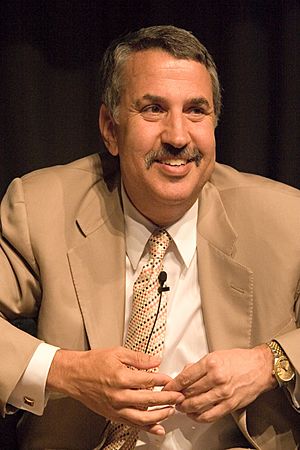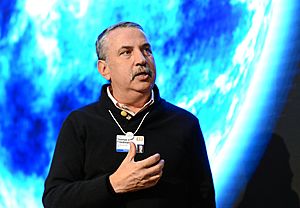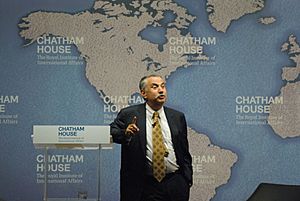Thomas L. Friedman facts for kids
Quick facts for kids
Thomas Friedman
|
|
|---|---|

Friedman in 2005
|
|
| Born |
Thomas Loren Friedman
July 20, 1953 |
| Education | Brandeis University (BA) St Antony's College, Oxford (MPhil) |
| Occupation | Author Columnist |
| Spouse(s) | Ann Bucksbaum |
| Children | 2 |
| Relatives | Matthew Bucksbaum (father-in-law) |
Thomas Loren Friedman (/ˈfriːd[unsupported input]/ FREED-mən; born July 20, 1953) is an American political commentator and author. He is famous for writing about world events and how countries connect. He has won the Pulitzer Prize three times. Today, he writes a weekly column for The New York Times newspaper.
Friedman started his career as a reporter. In the 1980s, he won two Pulitzer Prizes for his reporting on conflicts in Lebanon and politics in Israel. Later, in 2002, he won another prize for his writings about the "war on terror." He writes a lot about foreign affairs (how countries interact), global trade, the Middle East, globalization (how the world becomes more connected), and environmental issues.
Contents
Early Life and Education

Thomas Friedman was born on July 20, 1953, in Minneapolis, Minnesota. His father, Harold, worked for a company that made ball bearings. His mother, Margaret, was a homemaker and part-time bookkeeper. She also served in the United States Navy during World War II. Thomas has two older sisters, Shelley and Jane.
When he was young, Friedman dreamed of becoming a professional golfer. He played a lot of sports, especially tennis and golf. In 1970, he even worked as a caddy for famous golfer Chi Chi Rodriguez during the US Open.
Friedman is Jewish. He went to Hebrew school and later to St. Louis Park High School. There, he wrote for his school newspaper. He became very interested in Israel after visiting in 1968. He spent three summers living on a Kibbutz (a community farm) called HaHotrim in Israel. He said his high school years were "one big celebration of Israel's victory in the Six-Day War."
He first studied at the University of Minnesota. Then, he moved to Brandeis University, graduating in 1975. He also studied Arabic in Cairo, Egypt. After Brandeis, he went to St Antony's College, Oxford in England. There, he earned a degree in Middle Eastern studies.
Journalism Career
After finishing his studies, Friedman joined United Press International (UPI) in London. A year later, he moved to Beirut, Lebanon, in 1979. He lived there for two years, reporting on the Lebanon Civil War.
In 1981, The New York Times hired him. They sent him back to Beirut to cover the 1982 Israeli invasion of Lebanon. His reporting on this war, especially the Sabra and Shatila massacre, earned him his first Pulitzer Prize for International Reporting. He also won the George Polk Award.
In 1984, Friedman became the New York Times bureau chief in Jerusalem, Israel. He stayed there until 1988. That year, he won his second Pulitzer Prize for his reporting on the First Intifada (a Palestinian uprising). He wrote a book about his experiences in the Middle East called From Beirut to Jerusalem. This book won the National Book Award in 1989.
Later, Friedman covered Secretary of State James Baker and became the White House correspondent for the New York Times in 1992. In 1994, he started writing more about foreign policy and economics. The next year, he became a foreign affairs columnist for the New York Times opinion page. In 2002, he won his third Pulitzer Prize for his clear writing about the global impact of terrorism.
In 2002, Friedman met with Crown Prince Abdullah of Saudi Arabia. He encouraged the prince to try and end the Arab–Israeli conflict. This led to the Arab Peace Initiative, which Friedman has strongly supported.
He received the Overseas Press Club Award in 2004. That same year, Queen Elizabeth II honored him with the Order of the British Empire. In 2011, The New York Times reported that President Barack Obama had asked Friedman for advice on Middle East issues.
Views and Ideas
Thomas Friedman often shares his thoughts on important global issues.
On Digital ID Systems
Friedman has supported India's Unique Identification program, which uses biometrics (like fingerprints) for identification. He believes such systems can help societies innovate. He thinks concerns about privacy are not as big as some people make them out to be. He points out that social media companies like Google and Facebook track much more information about people.
On Globalization
Friedman has written a lot about globalization, which is how countries and people around the world become more connected. He first shared his ideas in his book The Lexus and the Olive Tree (1999). Later, he wrote The World Is Flat (2005). In this book, he suggests that technology has made the world "flat," meaning it's easier for people and businesses everywhere to connect and compete.
He believes that countries sometimes need to give up some economic control to global groups like capital markets. He calls this the "golden straitjacket." Friedman has also spoken about the United States needing to be more independent from foreign oil. He thinks it's important for the U.S. to attract talented people from around the world to help its economy grow.
On Terrorism
After the September 11 attacks in 2001, Friedman focused more on the threat of terrorism. His writings on this topic earned him a Pulitzer Prize in 2002. These columns were put together in his book Longitudes and Attitudes.
After the London bombings in 2005, Friedman suggested that the U.S. government should highlight "hate speech" that encourages violence. He believed it was important to distinguish between fair disagreement and actions that support terrorism.
On the Iraq War
Friedman supported the 2003 invasion of Iraq. He believed that creating a democratic country in the Middle East could encourage other countries in the region to become more open. He also pointed to Iraq's lack of cooperation with UN resolutions about weapons of mass destruction.
After the invasion, Friedman became concerned about how the war was managed. He hoped for a positive outcome in Iraq, but his optimism lessened over time. He once suggested that if certain groups in Iraq didn't cooperate, the U.S. should support others in a civil war. Critics have noted that Friedman often said "the next six months" would be crucial for the war's outcome, a phrase that became known as a "Friedman Unit."
On the Environment
Friedman believes that reducing our reliance on oil is key to weakening countries like Iran. He argues that the best way to do this is through energy conservation and developing alternative energy.
In his book Hot, Flat, and Crowded, he talks about the need for a "Green Revolution." He suggests that car companies receiving government money should plan to make all their vehicles hybrid-electric and able to run on cellulosic ethanol. He sees clean energy as the next big global industry.
On Israel
Friedman has written extensively about Israel. He has been criticized by some for his views on Israeli actions, while others have criticized him for being too critical of Israel. He has expressed concerns about settlements in occupied territories, seeing them as counter-productive.
He has also commented on the relationship between the U.S. and Israel. In 2023, he wrote about the Biden government's changing approach to Israel due to proposed judicial reforms. Following the Gaza war, he urged Israel to avoid military over-reach and further settlement expansions to prevent destabilizing the region.
On China
Friedman has written about China's unique political system. In 2009, he praised China's ability to make quick decisions, like boosting gasoline prices and investing in electric cars and solar power. However, he has also noted that China's leadership has not introduced political reforms alongside its economic growth. He believes that corruption remains a problem and that rule of law is weak.
His book The World is Flat was very popular in China. A translated article of his, "China Needs Its Own Dream," helped popularize the phrase "Chinese Dream," which was later used by Chinese leader Xi Jinping. In 2020, Friedman said that President Trump had been tougher on China than previous U.S. presidents.
On Radical Centrism
In the 2010s, Friedman wrote columns supporting "radical centrism." This idea suggests finding common ground and solutions that are not extreme left or right. He believed that this "radical center" needed its own movement to make a difference. He supported groups trying to find middle-ground candidates for elections.
Personal Life
Thomas Friedman's wife, Ann, is a teacher. They were married in London in 1978. They have two daughters, Orly (born 1985) and Natalie (born 1988). They live in Bethesda, Maryland.
Friedman supported Hillary Clinton in the 2016 U.S. presidential election. In the 2020 primaries, he supported Michael Bloomberg, and then Joe Biden in the general election. He is on the board of directors for Planet Word, a museum about language in Washington, D.C.
Awards
Friedman has won three Pulitzer Prizes for his journalism:
- 1983: For his reporting on the war in Lebanon.
- 1988: For his reporting on Israel.
- 2002: For his commentary on the global impact of terrorism.
Published Works
- From Beirut to Jerusalem (1989) – This book won the National Book Award.
- The Lexus and the Olive Tree: Understanding Globalization (1999)
- Longitudes and Attitudes: Exploring the World After September 11 (2002)
- The World Is Flat: A Brief History of the Twenty-first Century (2005)
- Hot, Flat, and Crowded: Why We Need a Green Revolution—And How It Can Renew America (2008)
- That Used to Be Us: How America Fell Behind in the World It Invented and How We Can Come Back (2011) – Co-written with Michael Mandelbaum.
- Thank You for Being Late: Finding a Job, Running a Country, and Keeping Your Head in an Age of Accelerations (2016)
See also
 In Spanish: Thomas Friedman para niños
In Spanish: Thomas Friedman para niños
- Curiosity quotient
- New Yorkers in journalism
 | Delilah Pierce |
 | Gordon Parks |
 | Augusta Savage |
 | Charles Ethan Porter |


